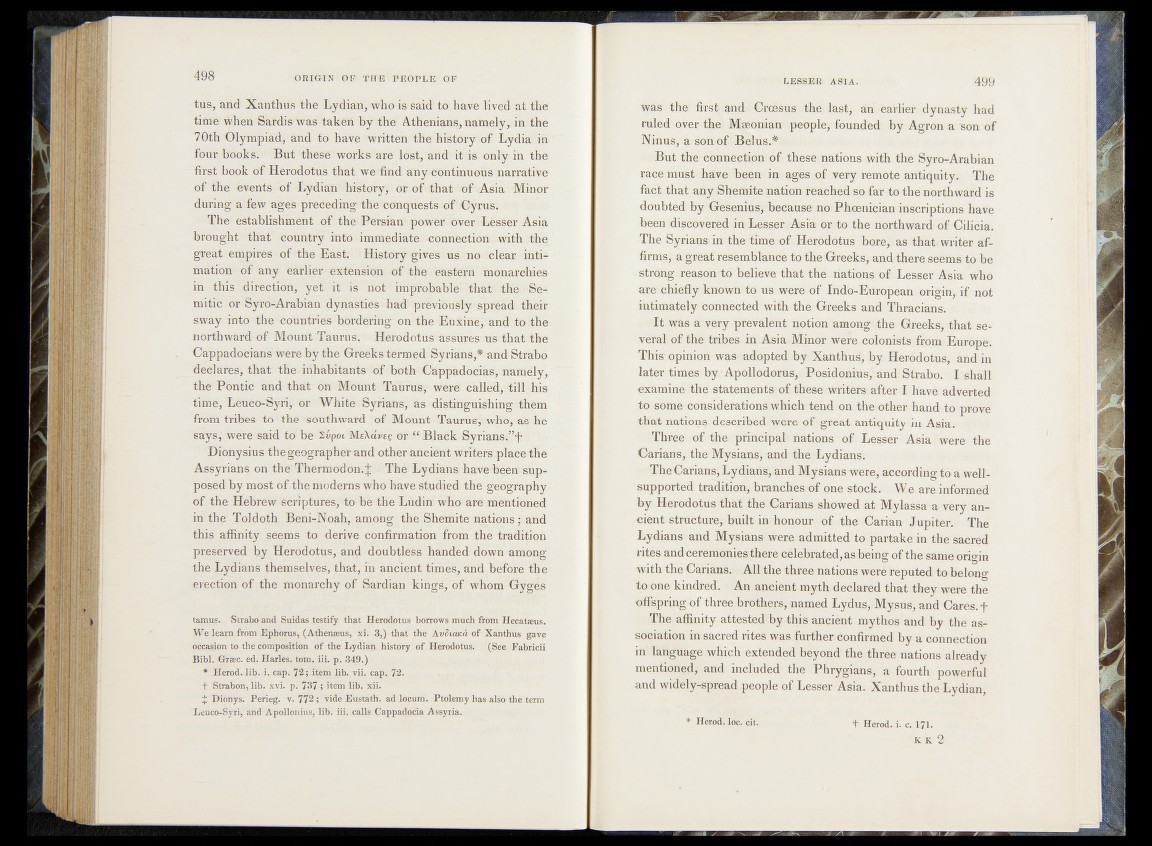
-ttts, and'- X anthus the Lydian, who is said t© have lived'at the
tinié' when Sardis5 wastakeh. bytheAthenians, nalnely,; in the
70th Olympiad, and to have'written the history^of Lydia'tin
foör höokfei ! But -’fchëse^ works até' -lost, and it dsionly in the
first book of Herodbtüs that we find any contmtieos narrative
of the- èveRt^fef Lydian history^ Ornfithatf ofi-Asia; Min or
during? a-few ages precedingtthe ednqdests o f Cy-rus/tiii
The* establishment of the Persian powértioverLessèr. Asia
brought that^feophtry into immediatettfconnection with the
great empires of the East. History gives usinotelear intimation
of "any earlier’ extension of the f eastern monarchies
in this direction, yeigSt- is not Mjifobable1 that.'; the^Se^.
m i t t dr Syrd-^Lrahian dynasties' had phëvibdêfyïBpTêad'their
HWay intrr thè;#öuntries bordering;,on^the«Etxrne; and toithé
northward d f Mount Taurus.? Herodotiï^assures'Tfs‘thafelÉ®
Cappadoeians were by the Greeks-termed Syrians,* andïStiabd
declares* that the inhabitants of both Cappadocias, num‘e%y
thé Pontic and that on Mount Taurus, were called, tiiM^his
time, Lëuco-Syri, or Whi téI Syrians, Rs-'distafi^iffliMii^lthéin
from tribes to the southward of Mount TauraS^whojfasfhe
were^said tóbé^^ip&t ^Xdvtc o r B l a c k SyriansWrb^
Dionysius thegeographer and other ancient writers place the
Assyrians on the Thermodon.JiJ The Lydians have%een supposed
by most of the moderns who have studied the*1 j|é$graphy
of the Hebrew scriptures, to be the Lüdin who are mentioned
in the Toldoth Beni-Noah,: among th e tShemite. nations ; and
this affinity jeem s to derive confirmation from the tradition
preserved by Herodotus, and doubtless handed down among
the Lydians themselves, that/in ancient times, and before the
erection of the monarchy of Sardian kings^ of whom Gyges
tamus. Strabo and Suidas testify that Herodotus borrows much from Hecatseus.
We learn from Ephorus, (Atheuseus, xi. 3,) that the AvSiiÓKci o f Xanthus gave
occasion to the composition of the Lydian history of Herodotus. (See Fahricii
Bihl. Gritec. ed. Harles. tom. iiL p. 349.); .
* Herbd. lib. i, cap. 72» item vii. cap.; 72«
+ Strabon, lib. xvi. p. 7 3 7 »item lib. xiiJ
% Didnys. Perieg. V. 772; vide Eustath. ad locum. Ptolemy has also the térm
Eeuco-Syri, and Apollonius, lib. iii. calls Cappadocia Assyria.
was the first andt- Crossus ; the last,- an earlier dynasty had
ruled over the- M^onian people, founded by Agron a son of
NinUs, a son* c#f Belus.#
But the connèetion of these; nations with the Syro-Arabian
race must have been; ini; ages of- very remote antiquity« Thé
fad^ithat any Shenaite^nation reached so far to the northward is
doubted by GVsénius^because no Phoenician inscriptions have
heen discovered in Lesser Asia or,to tihcmorthwardof Cilicia.
The Syrians in the time ?oi Herodotus bore* as that* writer affirm
«, a great resemblRncè to the Greeks, and there seems to be
> string reasonyto believér that/the n'ations of . Lesser Asia who
are-chiefly known-to us* were of- Indo-European origin, if not
intimately connected' with, the Greeks and Thracians.
I t w&s a very prevalent notion among^the. Greeks, th a t se*
veraf ofi thé* tribogs in Asia Minor were colonistsyfrom, Europe.
This* opinion'was' adopted by Xanthu^/hy Herodotu^ and in
later times by'Apollodorais,. Posidonius, and Sü-abo.^L shall
examine the statements.-of these writers after I have adverted
to some-considerations which tend on thejotfier hand" to prove
that nations-described were of 5great antiquity in Asia.
Three of the principal" nations of Lesser Asia were the
Carians/the Mysiaris, and the Lydians.
•'" 'The Carians, Lydians', and Mysians wer,e, according to a well-
supported tradition, branches of one stock. We are informed
by Herodotus that the Carians showed at Mylassa a very ancient
structure, built in-honour of the Carian Jupiter. The
Lydians and Mysians were, admitted to partake in the sacred
rités and ceremonies there celebrated, as being of the same origin
with the Carians. All the three nations were reputed to belong
to one kindred, s An ancient myth declared that they were the
•offspring of three brothers, named Lydus, Mysus, and Cares. +
The affinity attested by this anciènt mytiios and by the association
in sacred rites was further confirmed by a connection
in language which extended beyond the three nations already
mentioned, and included the Phrygians, a fourth powerful
and widely-spread people of Lesser Asia. Xanthus the Lydian,
■+ Herod, i. c. 171.
K-K. 2
* Herod, loc. cit.